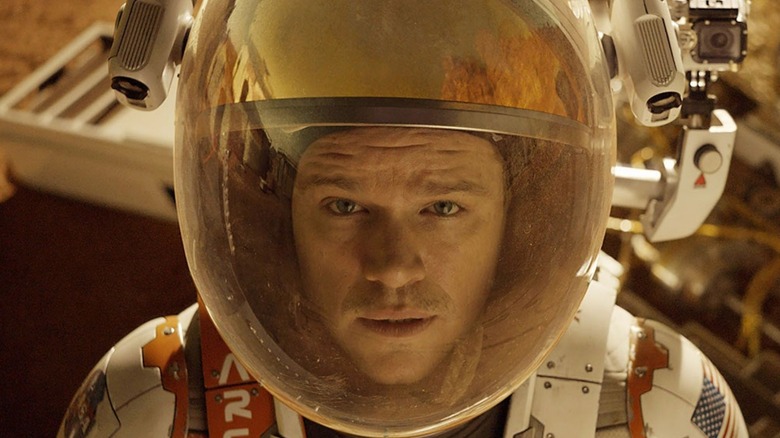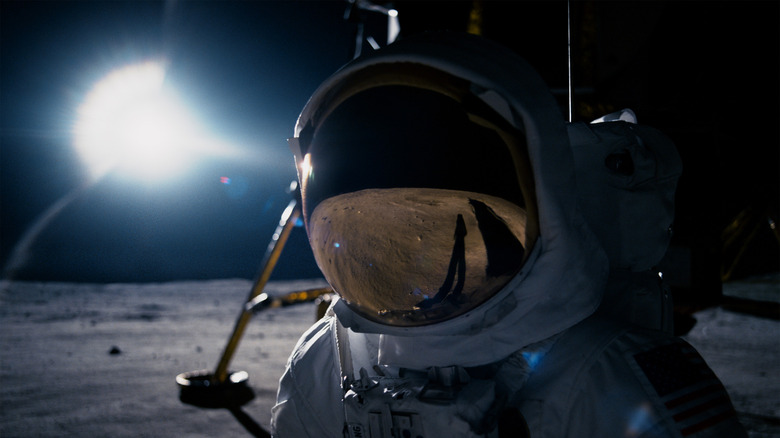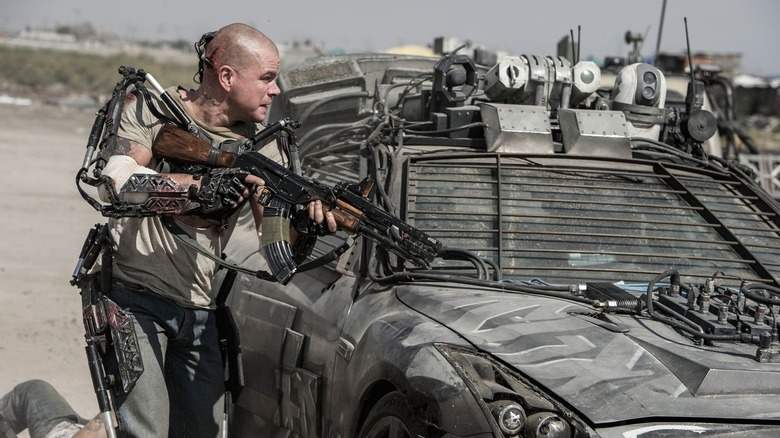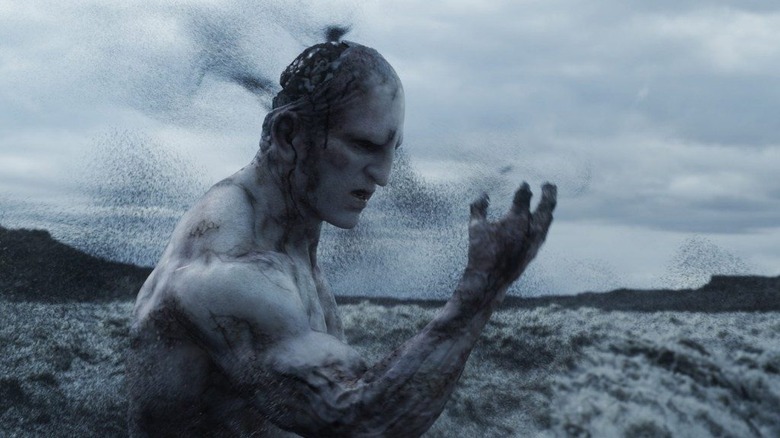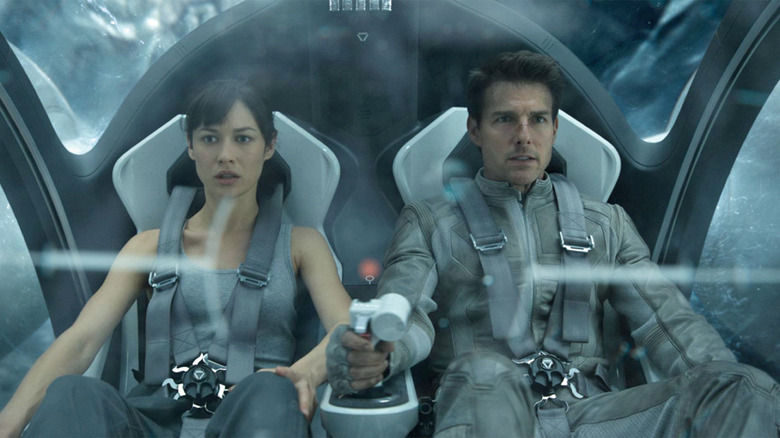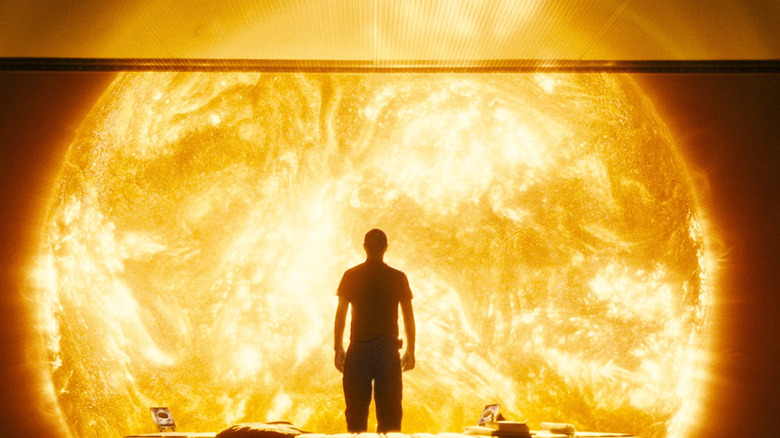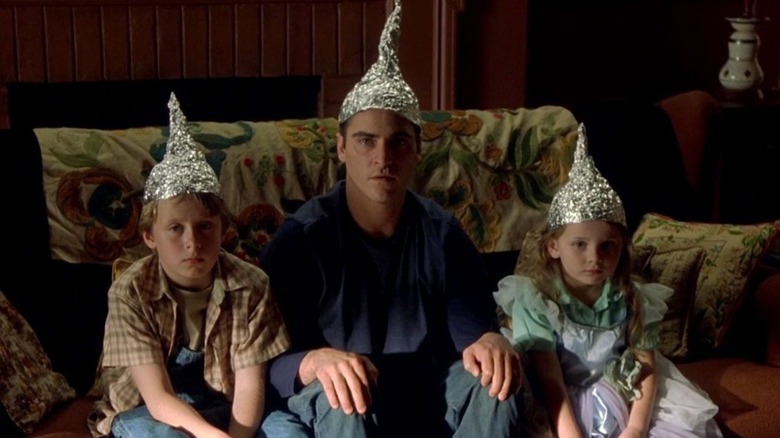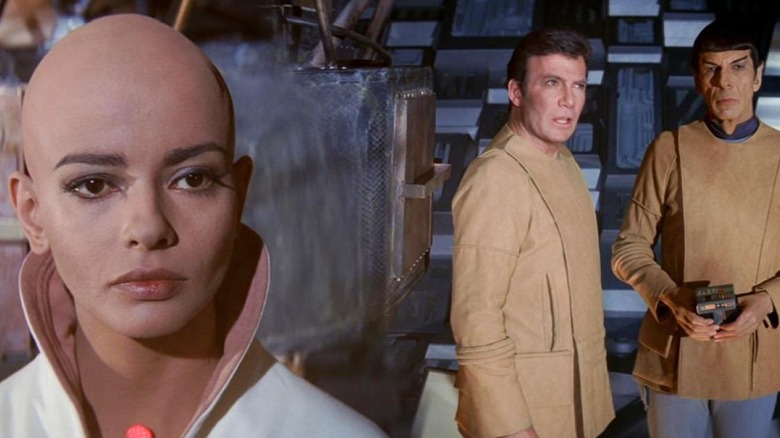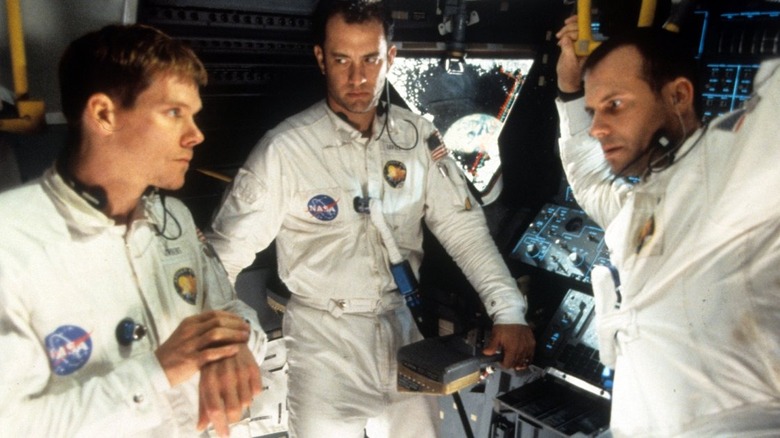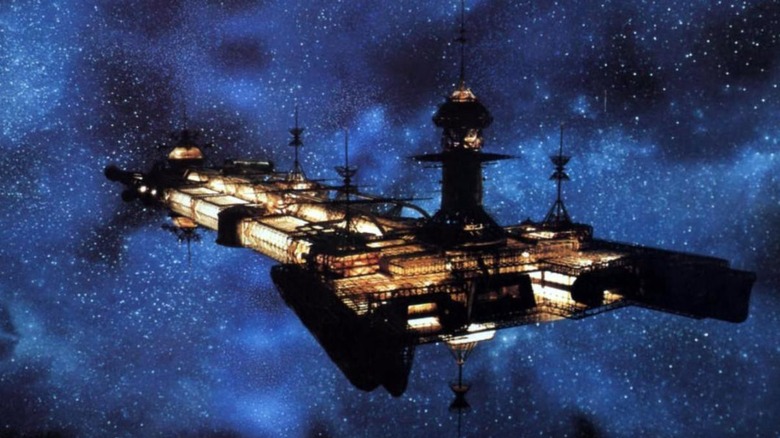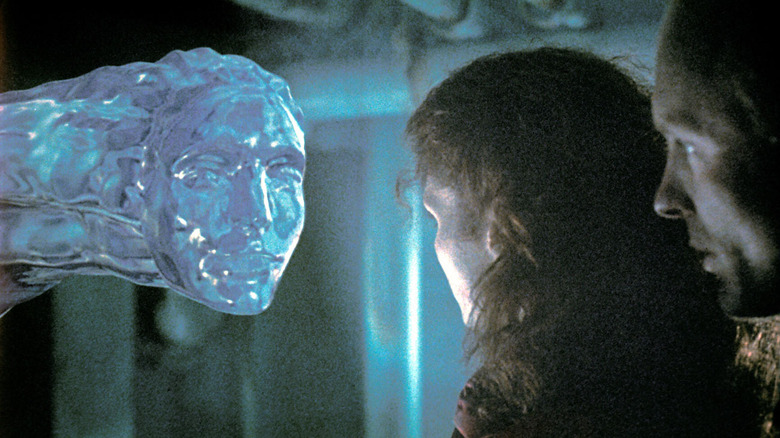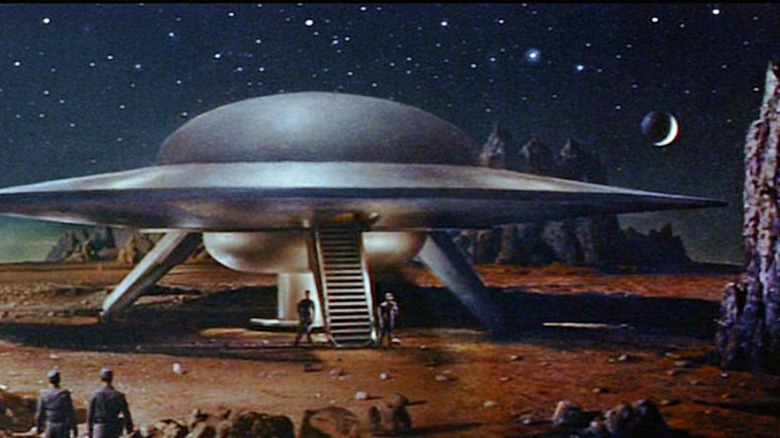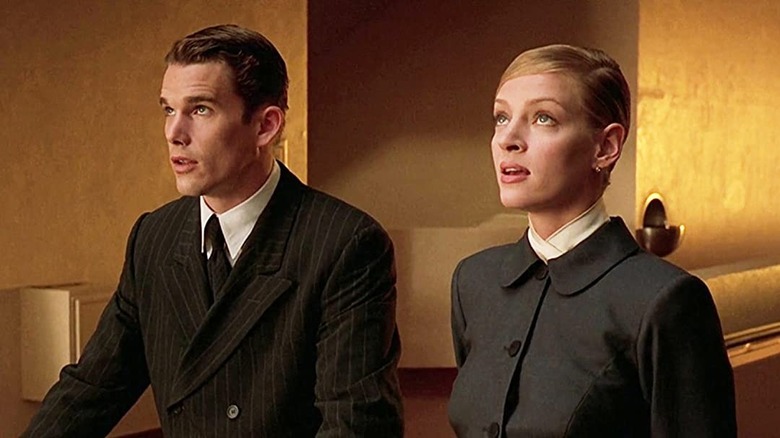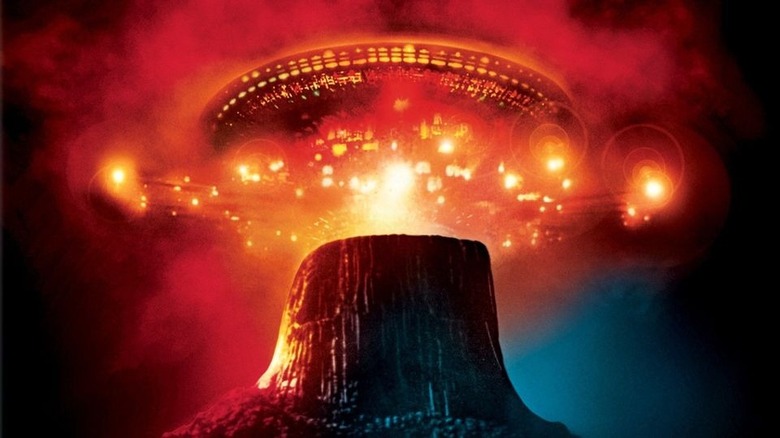13 Movies Like The Martian That Are Definitely Worth Watching
When it came out in 2015, "The Martian" filled a huge void in modern filmmaking. While the past few decades have produced many modern science fiction classics that take a cynical look at the future and humanity's eventual decline. "The Martian" thankfully offers a more optimistic sci-fi spectacle, showing how humanity grows more connected as alliances are formed between nations to save one man's life.
"The Martian" is also a refreshing film because it's a big blockbuster that isn't attempting to start a franchise. It's not an original story, as it's based on a novel by Andy Weir, but the self-contained nature of its narrative makes it more satisfying than a slew of post-credit teasers ever could. Screenwriter Drew Goddard did an excellent job adapting the unique voice of Weir's novel, capturing highly specific scientific details as well as the defiant, comedic perspective of astronaut Mark Watney (Matt Damon).
Watney is a botanist on a six-person NASA crew collecting samples on Mars. The team is forced to unexpectedly leave the planet during a devastating storm, and Mark is critically injured and presumed dead. After he awakens to find that he's now completely alone on the planet, Mark desperately tries to find a way back home. If you loved "The Martian," check out these movies too.
First Man
"The Martian" captures the reality of space travel and life at NASA in such specific detail that it almost doesn't feel like science fiction. The advancements made in space travel technology feel like the natural progression of science, and all of Watney's cutting edge techniques to survive his dangerous circumstances are grounded in actual scientific principles.
For more like that, check out Damien Chazelle's 2018 biopic "First Man," which explores early achievements in outer space travel by telling the story of Neil Armstrong (Ryan Gosling), a figure who Watney himself comedically references in "The Martian." Obviously, Armstrong is one of the most famous figures in U.S. history, but "First Man" gives rare insights into the crippling personal issues that he dealt with during his pivotal mission. Armstrong's young daughter died of a rare disease early in his service to NASA, and much of his lunar launch was spent coping with the loss.
Armstrong's wife (Claire Foy) fears for his safety, as she doesn't want her two sons to grow up without a father. Armstrong himself is secluded and often silent, struggling to communicate his feelings to his family and crew alike. One of the main themes of "The Martian" is isolation, as Watney reflects that he is the loneliest man in the universe. Armstrong feels similarly isolated in "First Man," as he's burdened with unprecedented expectations. Like Damon, Gosling gives a sensitive performance that captures the gravity of Armstrong's mission.
Elysium
Matt Damon is one of the most fascinating leading men in Hollywood, as despite the fact that he's been a world-famous celebrity since the success of "Good Will Hunting" over two decades ago, he regularly takes risks on a wide variety of projects. His performance as Watney in "The Martian" combined all of the aspects that make him such an endearing personality; he's confident and charismatic, and although he's accumulated many specialized skills through hard work, he is a relatable character placed in a difficult situation. It's a shame that Damon has appeared in only a few science fiction films, as he does a great job keeping otherworldly concepts grounded in reality.
However, Damon did deliver one very underrated performance in the 2013 sci-fi thriller "Elysium." Directed by "District 9" filmmaker Neil Blomkamp, the film takes place in the 22nd century, after the Earth has been ravaged by crippling pollution and disease. Medical resources are scarce, so when Max Da Costa (Damon) is accidentally exposed to radiation, things look grim. He finds that his disease can only be cured on Elysium, a space station that only wealthy clients have access to, and enlists a team of smugglers to help him break into the station.
Prometheus
Ridley Scott is one of the most important science fiction filmmakers in the history of cinema. Shortly after his directorial debut "The Duellists" in 1977, Scott helmed one of his most defining works, 1979's "Alien." By basically moving "Jaws" to space, Scott launched a brand of outer space horror that is still replicated to this day. Like "The Martian," "Alien" explored the reality behind space travel; it wasn't an epic, heroic adventure, but rather an extension of the same working conditions on Earth. "Alien" was refreshing in the post-"Star Wars" era of sci-fi; "The Martian" was similarly novel in 2015, when it went up against the likes of "Jupiter Ascending" and "The Force Awakens."
Scott handed off the "Alien" sequels to James Cameron, David Fincher, and Jean-Pierre Jeunet, but he returned to the universe in 2012 with "Prometheus." Like "The Martian," "Prometheus" told an exploratory story about scientists who embark on a noble mission, yet are challenged by the perils of a new environment. Elizabeth Shaw (Noomi Rapace) is an archeologist on the Prometheus spacecraft, which is dispatched to the distant moon LV-223 by the Weyland Corporation.
Like Watney, Shaw is a highly relatable character. She is very intelligent but remains modest about her skills, and she truly cares about making a critical discovery that could aid future generations. Shaw is given depth by both her faith and her inability to have children; both give her a reason to seek out the origins of life itself.
Oblivion
Watney's isolation is well handled throughout "The Martian," as he feels increasingly lonely as a result of being the only man on an entire planet. The early sequences that establish Watney's friendship with his crew, particularly Commander Lewis (Jessica Chastain), make his absence more devastating. Watney's crew is more than just a team of scientists — it's more like a family that he's forced to live without. Damon captures his character's fragile emotional state with a sensitive performance that earned him an Academy Award nomination for best actor.
Another one of Hollywood's most popular leading men showed similar emotional vulnerability in an underrated science fiction adventure. Compared to his more action-centric roles, Tom Cruise was much more understated with his performance in the 2013 film "Oblivion." In the film, he stars as Jack Harper, a technician who repairs drones on the remnants of Earth following a cataclysmic event that wiped out most life. The rest of humanity lives in colonies and spacecraft far away, with Harper and his partner Victoria Olsen (Andrea Risenborough) left on the planet alone.
Like Watney, Harper is forced to live apart from the people he cares about the most. Although his memory was wiped, Harper gradually begins to remember moments from his past after meeting the resistance leader Malcolm Beech (Morgan Freeman), and is tormented by visions of his wife, Vika (Olga Kurylenko).
Sunshine
"The Martian" is one of the best modern films about space travel, as it focuses on the routines that a crew goes through as they venture on a dangerous mission. Space travel isn't lionized by action-packed adventure. The heroes of "The Martian" are scientists, workers, and military personnel who are simply doing their jobs. This more realistic take on space travel didn't make the film's narrative less exciting, as it's still inspirational to see realistic characters working together to solve a crisis, allowing the audience to connect with the ensemble on a more emotional level.
Beyond "The Martian," there have been many great recent films exploring the perils of space travel. Danny Boyle's 2007 feature "Sunshine" is one of them. Set in 2057, the film follows the crew of the Icarus II spacecraft as they travel to re-energize the dying sun. The team is tasked with commandeering the first failed mission, Icarus I, and know that, in all likelihood, they won't return home safely.
Signs
"The Martian" is a grounded science fiction film that gradually introduces the viewer to more fantastic elements. As Weir, the author of the novel, was a programmer before he became a writer, he meticulously explores what life on the Martian surface looks like. None of Watney's innovations are created overnight, and he's careful about testing out different food sources, communication techniques, and escape preparations.
M. Night Shyamalan is known for his "elevated" approach to genre storytelling, characterized by a methodical and insightful examination of genre cliches and how they relate to more realistic characters. 2002's "Signs" isn't just a great combination of science fiction and horror, but an emotional drama about a family that comes together to cope with a loss. Mel Gibson stars as the former Father Graham Hess, who abandoned his faith following the death of his wife. Graham's brother Merrill (Joaquin Phoenix) helps to raise his two young children, Morgan (Rory Culkin) and Bo (Abigail Breslin). Merrill is also coping with an uncertain future, as he was expected to be a baseball star, but never committed himself fully to the sport. In addition, Graham struggles to forgive veterinarian Ray Reddy (Shyamalan), who was involved in the car accident that killed his wife, Colleen.
Then the early stages of an alien invasion begin, and the family is forced to heal together. "Signs" works by isolating the characters and telling an intimate story instead of focusing on the big global events.
Star Trek: The Motion Picture
"Star Trek" is one of the foundations of modern science fiction. Almost all sci-fi released since the debut of the original series in 1966 is indebted to it in some way. Gene Rodenberry's optimistic look at humanity's future is stuffed with actual scientific logic, relevant social and political commentary, a great ensemble of characters, and a believable sci-fi world, all things that are also integral to "The Martian."
The "Star Trek" franchise has had its ups and downs on the big screen, but 1979's "Star Trek: The Motion Picture" from director Robert Wise was the one that started it all. Compared to the science fiction films of the era, such as "Star Wars," "Superman: The Movie," and "Moonraker," "Star Trek: The Motion Picture" is a straightforward drama that has more in common with "The Martian" than the big, action-packed adventures. Rather than pitting the crew against a fearsome villain, the "Enterprise" team searches for a mysterious series of messages from a being called "Vger."
Over a decade had passed since the conclusion of the original "Star Trek" series, so the actors had to adjust to playing more mature versions of their characters. James T. Kirk (William Shatner) is now an Admiral in Starfleet, but he returns to the captain's chair, which he takes from its current inhabitant, William Decker (Stephen Collins). Spock joins his old crew after taking time away to spend on his home planet, where is undergoing an ancient Vulcan practice to purge himself of emotion.
Apollo 13
The realistic depiction of space travel in "The Martian" helps highlight and honor the achievements of real astronauts, and both Weir and Scott paid tribute to these real-life heroes through references and homages. Watney shares many qualities with these prominent historical figures, and not just because of his profession. Due to the unforeseen circumstances, Watney is forced to rely on unreliable technology and bet his life on last-minute changes to the plan.
Watney's survival mission in "The Martian" has a lot in common with the exploits of the Apollo 13 crew, which were depicted brilliantly in Ron Howard's 1995 film of the same name. Commander Jim Lovell (Tom Hanks), Lunar Module Pilot Fred Haise (Bill Paxton), and Module Pilot Jack Swigert (Kevin Bacon) are dispatched on a lunar mission that goes awry when an explosion derails their path to the Moon. The crew is forced to make last-minute adjustments in order to circumvent the Moon and return safely to Earth.
Like "The Martian," "Apollo 13" is equally centered on the heroism of the astronauts and the ground crew. Ed Harris received an Academy Award nomination for his brilliant performance as White Team Flight Director Gene Kranz, who desperately tries to communicate with the Apollo 13 crew from NASA headquarters.
The Black Hole
There are notes of intergalactic existentialism in "The Martian," as both Mark and the NASA crew are forced to question the nature of what they do and the benefits that it provides. Mark's time in isolation makes him question why he chose such a dangerous profession, and while he reflects on his love of natural science, he's forced to ask Commander Lewis to talk to his parents in case he doesn't return. Hermes flight commander Mitch Henderson (Sean Bean) voices one of the most powerful ideas in the film, stating that the international alliances and resources poured into rescuing Watney will make everything worth it.
The 1979 science fiction adventure film "The Black Hole" tackles similar existential questions about the survival of humanity, our reliance on technology, and the finality of destiny. Like "The Martian," it centers on a group of scientists who are forced to make decisions that will impact future generations back on Earth. Captain Dan Holland (Robert Forster), Dr. Hans Reinhardt (Maximilian Schell), Dr. Alex Durant (Anthony Perkins), Lieutenant Charlie Pizer (Joseph Bottoms), and Dr. Kate McCrae (Yvette Mimieux) lead their vessel, the Palomino, in a search for the crew of the Cygnus, which is lost in deep space. McCrae has a particular emotional tie to the mission, as her father was on the Cygnus.
The Abyss
"The Martian" is an impressive achievement in visual effects; the computer-generated imagery was incorporated seamlessly into the adventure. The special effects aren't flashy, but there are many small details in both the various spacecrafts and the Martian surface that many audience members won't even pick up on. Modern CGI is indebted to the work of James Cameron, who has been a pioneer of photo-realistic visual effects throughout his career.
One of Cameron's earliest achievements in CGI came in 1989's "The Abyss," a science fiction adventure that has a similar premise to "The Martian." The film centers on a team of scientists who are searching for a submarine caught in a conflict between the U.S. and the Soviet Union. Along the way, they discover an extraterrestrial creature that threatens their mission. Both "The Abyss" and "The Martian" focus on the personal dynamics of their crews, as they're forced to make critical, life-or-death decisions.
Forbidden Planet
The science fiction films of the 1950s were pivotal to the growth of the genre. While outer space adventures have been part of cinema since "A Trip to the Moon," the '50s films depicted voyages beyond our solar system years before the Apollo 11 mission even began. Although many of these films feature outlandish aliens, flying saucers, and magic, they also previewed real developments in the space program. Hopefully, the optimistic vision of the future depicted in "The Martian" is similarly predictive.
One of the most important early sci-fi classics is 1956's "Forbidden Planet." Set during the 23rd century, the film focuses on the United Planets starship C-57D as it searches for a lost crew on the planet Altair IV. Walter Pidgeon's conflicted performance as the team's commander Dr. Edward Morbius is similar to Damon's work as Watney, as Morbius struggles with the pressures that come with such a dangerous mission.
Gattaca
"The Martian" is a particularly entertaining work of science fiction because it incorporates elements of actual science. Watney's biological tests and the physics of the rescue mission were inspired by actual developments in theoretical science, and the film captures life at NASA very realistically. By grounding so much of the story in a world that actually exists, "The Martian" feels more realistic.
Another science fiction film that combines real concepts with fictitious ones is the 1997 classic "Gattaca." Andrew Niccol's directorial debut is set in a biopunk future where destiny is predetermined by genetic makeup, and only the select elite have the agency to rule society. Vincent Freeman (Ethan Hawke) is discriminated against because he was born naturally and not within the eugenics program, and as a result he's unable to realize his lifelong dream to join the space program. In order to realize his goals, Freeman uses the DNA of an injured man, Jerome Eugene Morrow (Jude Law), to falsify his identity.
Close Encounters of the Third Kind
"The Martian" wrings a lot of drama out of its story by showing events from multiple points of view. While Watney's perspective is obviously the most dominant, the film takes time to explore how each of the groups involved in his rescue approach their tasks differently. While they're separated and on different assignments, Watney, the Ares III team, NASA headquarters, and international space programs all have an important part to play in bringing the lost astronaut home.
1977's "Close Encounters of the Third Kind" is one of the quintessential science fiction films, and Steven Spielberg brilliantly depicts how different characters respond to and interact with an upcoming alien visit. The landing of the extraterrestrial vessel doesn't occur until the film's third act, and the majority of the film is filled with moments of wonder as the early signs of a supernatural event appear. The ensemble cast includes Richard Dreyfuss, François Truffaut, Teri Garr, Melinda Dillon, Bob Balaban, and Robert Blossoms.
